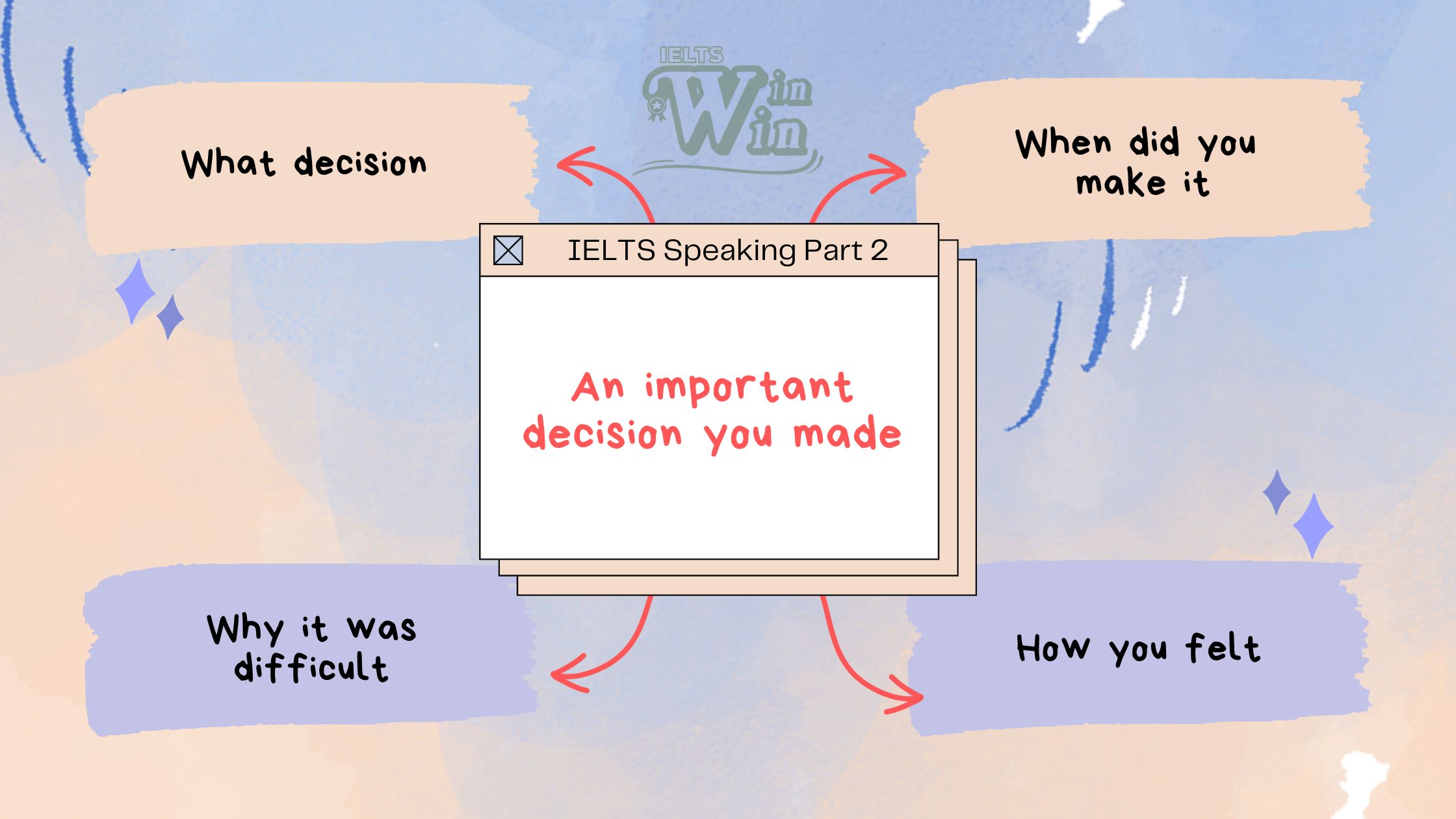✨Part 2: An important decision you made
- What decision
- When
- Why it was difficult to make
- How you felt
When mentioning a decision that I have made, one significant choice came to my mind was when I made a transition into a career in the IT industry. This decision took place approximately one year ago when I was in the last moments of my final highschool year.
The act of pursuing an IT career instead of a more traditional path was a challenging choice for several reasons. Firstly, at that stage, most of my peers were considering entering college to study business or other conventional fields. Diverging from the norm meant going against the expectations of my family and friends, which added an additional layer of pressure and uncertainty. To be honest, I found it quite complex as the transition to the IT industry required acquiring technical skills and knowledge in areas such as programming, computer systems, and software development. Therefore, just the thought of starting from scratch in a highly technical and competitive industry was intimidating. Not only that, the timing of this decision also added to the difficulty. Being in the final year of high school meant preparing for college applications, standardized exams, and making crucial choices about future education. Balancing these responsibilities while exploring a completely different career path was a daunting task. Emotionally, making this decision brought a mix of excitement and apprehension.
Looking back, I am grateful for the decision I made to transition into an IT career during my final year of high school. Embracing this unconventional path has allowed me to develop valuable technical skills and pursue a career that aligns with my genuine interests and aspirations.
• significant /sɪɡˈnɪfɪkənt/ - đáng kể, quan trọng
• transition /trænˈzɪʃən/ - sự chuyển tiếp, sự chuyển đổi
• industry /ˈɪndəstri/ - ngành công nghiệp
• pursuing /pərˈsuːɪŋ/ - theo đuổi
• conventional /kənˈvenʃənl/ - truyền thống
• expectations /ˌekspekˈteɪʃənz/ - kỳ vọng
• uncertainty /ʌnˈsɜːrtənti/ - sự không chắc chắn
• intimidating /ɪnˈtɪmɪdeɪtɪŋ/ - đáng sợ, gây sợ hãi
• standardized /ˈstændədaɪzd/ - chuẩn hóa
• Emotionally /ɪˈməʊʃənli/ - về mặt cảm xúc
• excitement /ɪkˈsaɪtmənt/ - sự hào hứng, sự phấn khích
• apprehension /ˌæprɪˈhenʃən/ - sự lo lắng, sự sợ hãi
• unconventional /ˌʌnkənˈvenʃənl/ - không truyền thống
• genuine /ˈdʒenjuɪn/ - chân thành, thành thật
• aspirations /ˌæspəˈreɪʃənz/ - khát vọng, hoài bão.
Part 3
✨What kinds of decisions do people usually make in their daily life?
People make various decisions in their daily lives, ranging from simple and routine choices to more complex and impactful ones. Common decisions include what to wear, what to eat, how to manage time, how to prioritize tasks, and how to handle daily responsibilities. They also make decisions related to personal relationships, career paths, educational pursuits, financial matters, health and well-being, and long-term goals.
• routine /ruːˈtiːn/ - công việc thường ngày, thói quen
• impactful /ɪmˈpæktfʊl/ - có tác động, có ảnh hưởng
• responsibilities /rɪˌspɒnsəˈbɪlɪtiz/ - trách nhiệm, nhiệm vụ
• related /rɪˈleɪtɪd/ - có liên quan, có quan hệ
• educational /ˌedjʊˈkeɪʃənl/ - giáo dục, mang tính giáo dục
• well-being /ˌwelˈbiːɪŋ/ - sức khỏe, trạng thái tốt
• long-term /ˌlɒŋˈtɜːm/ - dài hạn
✨What kinds of decisions are difficult for young people to make?
Young people may find certain decisions challenging due to their stage of life and limited experience. Some decisions that can be difficult for them include choosing a career path, deciding on higher education options, making significant financial choices, handling relationships and social pressures, and making independent choices that shape their future. These decisions often involve considering long-term implications and balancing personal aspirations with external expectations.
• career /kəˈrɪər/ - sự nghiệp, sự sự nghiệp
• significant /sɪɡˈnɪfɪkənt/ - đáng kể, quan trọng
• pressures /ˈpreʃəz/ - áp lực, sức ép
• independent /ˌɪndɪˈpendənt/ - độc lập, tự do
• involve /ɪnˈvɒlv/ - liên quan, tham gia
• implications /ˌɪmplɪˈkeɪʃənz/ - hệ quả, tác động tiềm tàng
• balancing /ˈbælənsɪŋ/ - cân bằng, sự cân đối
• aspirations /ˌæspəˈreɪʃənz/ - khát vọng, hoài bão
• expectations /ˌekspekˈteɪʃənz/ - kỳ vọng
✨What should people do when making such decisions?
When making important decisions, it is helpful for individuals to gather relevant information, consider the potential outcomes and consequences, and evaluate their own values, preferences, and long-term goals. Seeking advice from trusted mentors or experts in the respective fields can provide valuable insights. It is also beneficial to reflect on personal strengths, weaknesses, and interests while considering the potential risks and benefits of each option. Taking time for self-reflection and weighing different perspectives can aid in making well-informed decisions.
• individuals /ˌɪndɪˈvɪdʒʊəlz/ - cá nhân, người cá nhân
• potential /pəˈtenʃəl/ - tiềm năng, khả năng
• consequences /ˌkɒnsɪˈkwɛnsɪz/ - hậu quả, kết quả
• preferences /ˈprefrənsɪz/ - sở thích, lựa chọn
• insights /ˈɪnsaɪts/ - hiểu biết, sự nhận thức sâu sắc
• beneficial /ˌbenɪˈfɪʃəl/ - có lợi, có ích
• potential /pəˈtenʃəl/ - tiềm năng, khả năng
• perspectives /pəˈspektɪvz/ - quan điểm, góc nhìn
• well-informed /ˌwel ɪnˈfɔːmd/ - thông tin đầy đủ, hiểu biết sâu rộng
✨Do you think it is easier to make a decision by yourself or by discussing it with others?
The ease of making a decision can vary depending on the individual and the nature of the decision. In some cases, making a decision independently can be faster and more efficient, especially for routine choices or decisions that align with personal preferences. However, for complex or life-altering decisions, discussing the options with others can provide different perspectives, insights, and considerations that may help in making a more well-rounded and informed decision.
• vary /ˈveəri/ - thay đổi, khác nhau
• independently /ˌɪndɪˈpendəntli/ - độc lập, tự do
• efficient /ɪˈfɪʃənt/ - hiệu quả, có hiệu lực
• perspectives /pəˈspektɪvz/ - quan điểm, góc nhìn
• considerations /kənˌsɪdəˈreɪʃənz/ - sự cân nhắc, suy nghĩ
• well-rounded /ˌwelˈraʊndɪd/ - toàn diện, đầy đủ
✨Who do young people often ask for advice when they need to make a tough decision?
When faced with tough decisions, young people often turn to various sources for advice. They may seek guidance from parents, close family members, friends, teachers, mentors, or professionals in relevant fields. Each person offers different perspectives and experiences, providing young individuals with a diverse range of insights and support.
• guidance /ˈɡaɪdəns/ - sự hướng dẫn, sự chỉ dẫn
• professionals /prəˈfeʃənəlz/ - chuyên gia, nhà nghiên cứu
• perspectives /pəˈspektɪvz/ - quan điểm, góc nhìn
• insights /ˈɪnsaɪts/ - hiểu biết, sự nhận thức sâu sắc
✨Why do you think many young people don’t like to follow their parents' advice?
There can be several reasons why young people may choose not to follow their parents' advice. It is a natural part of growing up and establishing their own identities and independence. They may want to explore their own path, make their own mistakes, and learn from personal experiences. Sometimes, there may also be generational or cultural differences that influence their perspectives and decision-making. However, it's important to note that this can vary greatly among individuals, and many young people still value and seek guidance from their parents.
• establishing /ɪˈstæblɪʃɪŋ/ - thiết lập, thành lập
• identities /aɪˈdentɪtiz/ - danh tính, bản sắc
• independence /ˌɪndɪˈpendəns/ - độc lập, sự tự do
• generational /ˌdʒenəˈreɪʃənl/ - thế hệ, liên quan đến thế hệ
• influence /ˈɪnfluəns/ - ảnh hưởng, tác động
• decision-making /dɪˈsɪʒənˌmeɪkɪŋ/ - quá trình ra quyết định
• greatly /ˈɡreɪtli/ - rất, đáng kể
• seek /siːk/ - tìm kiếm, đòi hỏi
✨What should people do to make better decisions in the future?
In order to improve future decision-making, individuals can employ strategies to enhance their choices. This may involve seeking different perspectives, reflecting on past experiences, considering long-term consequences, evaluating personal values, managing risks, trusting intuition, seeking feedback, and making necessary adjustments. By utilizing these approaches, individuals can make more informed and effective decisions in various areas of their lives.
• decision-making /dɪˈsɪʒənˌmeɪkɪŋ/ - quá trình ra quyết định
• reflecting /rɪˈflektɪŋ/ - phản ánh, suy nghĩ lại
• consequences /ˌkɒnsɪˈkwɛnsɪz/ - hậu quả, kết quả
• adjustments /əˈdʒʌstmənts/ - điều chỉnh, sự điều chỉnh
• utilizing /ˈjuːtɪlaɪzɪŋ/ - sử dụng, tận dụng
• effective /ɪˈfektɪv/ - hiệu quả, có hiệu lực
• various /ˈveəriəs/ - đa dạng, khác nhau.
Xem thêm các bài viết về Speaking Part 2 và 3 ở đây bạn nhé
Đừng ngần ngại để lại thông tin hoặc liên hệ với chúng mình qua địa chỉ sau đây để IELTS WinWin có thể hỗ trợ tốt nhất cho bạn nhé!
Địa chỉ: 118 Nguyễn Xuân Khoát, P. Tân Thành, Q. Tân Phú, TP. Hồ Chí Minh.
Fanpage: IELTS WinWin
Zalo: 0965 439 239 – 085 301 8788
Website: ieltswinwin.com



